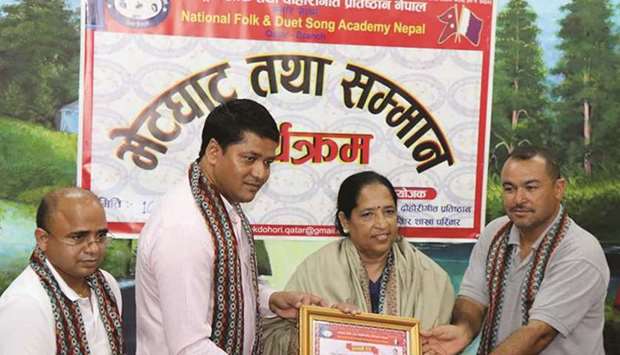With more than 1,500 songs to her name since the 1980s, Hari Devi Koirala, classical folk singer of Nepal, quietly, without fanfare, completes almost four decades in the music industry. Nothing about her is ostentatious. At a time when her peer colleagues and even juniors have hung up their boots, she continues to rule the roost. In this journey Koirala has successfully bagged over 250 awards for her melodious unforgettable songs.
Born and raised in Kaski, West of Kathmandu, she started singing at a tender age of 17. “Those were days, when I would see a small paper flying in the sky and I would make a song out of it,” says Koirala. Now 63, she recently visited Doha to perform during a Teej Festival and Community sat down with her to run the gamut of a rich four-decade journey in the Nepali music industry.
Tell us about your journey. How it all started?
I always used to sing behind a closed door during my teenage times. I used to be afraid if anybody would hear me. Forty or fifty years ago, singing wasn’t really considered a very respectable career. My family used to discourage it as well. I still remember once I asked my mother to support me pursue singing as a professional career and she said, ‘You have to marry soon. Who will marry you if you’re a singer.’ But I never gave up. I’ve never taken a professional training but my passion was enough to hone my skills over the period of time. After my marriage, my husband recognised my talent and encouraged me to sing. At first, I was scared that it might affect my life but my better half has been a huge support to me. In 1980, I went to Kathmandu with my husband to record my first song in Radio Nepal. During that time, recording had to be done in one take, if somebody made a mistake; he or she had to sing all over again. I completed in a one-go. The song was recorded and broadcasted on the radio and well offers started pouring in.
Four decades into music industry. What’s changed?
During our time, lyrics had to be approved from Radio Nepal. There was a strict screening for what’s being broadcasted and promoted through music. These days, anyone can sing anything with any sort of composition. Singers like Purushottam Neupane, Ram Joshi, Ambika Bhandari, Prem Raja Mahat and Narayan Rayamajhi are doing great work these days. They have infused modern tunes with contemporary music and it is wonderful I must say.
Who has been your driving force for all these years?
First my husband motivated me, then my children, and now my grandchildren. My family is my driving force. They encourage my and inspire me.
Any advice for aspiring young musicians?
I feel there’s a sort of anxiety among youth. They are afraid of failure. My advice for them is to be patient and work hard. If you struggle and work hard with all honesty, you’re going to make it big sooner or later.
Nepal has recently emerged as a tourist attraction. Your comments?
We have incomparable religious, ethnic, linguistic and cultural diversity and, we have to cherish and preserve all of those cultures. We have folk culture that allows women to sing and dance, though just for a couple of days in a year, but we have creatively employed that and I think that’s what attracts people worldwide.
You’ve first time performed in Qatar. How was the experience like?
Qatar made me feel like home and it was a great experience. I hope to come back soon and perform again.

HONOURED: National Folk and Duet Song Academy Qatar recently honoured Koirala during an event.
